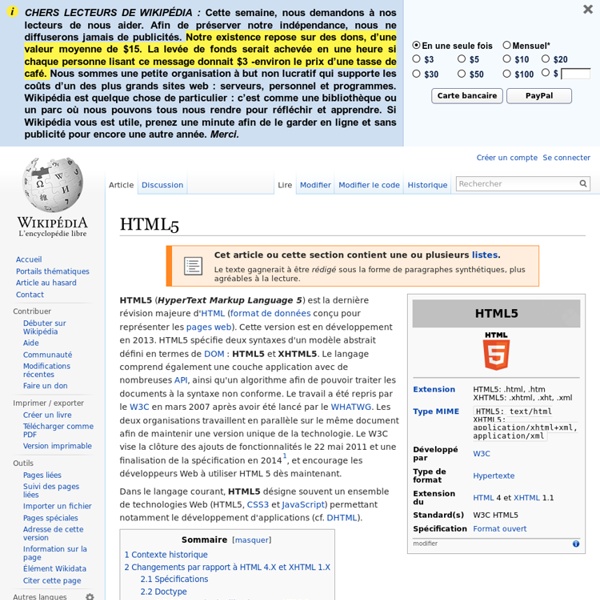



http://fr.wikipedia.org/wiki/HTML5
HTML 5 and CSS 3: The Techniques You’ll Soon Be Using In this tutorial, we are going to build a blog page using next-generation techniques from HTML 5 and CSS 3. The tutorial aims to demonstrate how we will be building websites when the specifications are finalized and the browser vendors have implemented them. If you already know HTML and CSS, it should be easy to follow along. Before we get started, consider using one of our HTML5 Templates or CSS Themes for your next project—that is, if you need a quick and professional solution. HTML5 Latest Published Version: Latest Editor's Draft: Previous Versions: Editors: Robin Berjon, W3C HTML: The Markup Language This specification defines the 5th major version, first minor revision of the core language of the World Wide Web: the Hypertext Markup Language (HTML). In this version, new features continue to be introduced to help Web application authors, new elements continue to be introduced based on research into prevailing authoring practices, and special attention continues to be given to defining clear conformance criteria for user agents in an effort to improve interoperability. This section describes the status of this document at the time of its publication. Other documents may supersede this document.
HTML5: Edition for Web Authors This document is a strict subset of the full HTML5 specification that omits user-agent (UA) implementation details. It is targeted toward Web authors and others who are not UA implementors and who want a view of the HTML specification that focuses more precisely on details relevant to using the HTML language to create Web documents and Web applications. Because this document does not provide implementation conformance criteria, UA implementors should not rely on it, but should instead refer to the full HTML5 specification.
Can I use... Support tables for HTML5, CSS3, etc About "Can I use" provides up-to-date browser support tables for support of front-end web technologies on desktop and mobile web browsers. The site was built and is maintained by Alexis Deveria, with occasional updates provided by the web development community. The design used as of 2014 was largely created by Lennart Schoors. May I use your data in my presentation/article/site, etc? Yes, the support data on this site is free to use under the CC BY 4.0 license. HTML5 This specification defines the 5th major version, second minor revision of the core language of the World Wide Web: the Hypertext Markup Language (HTML). In this version, new features continue to be introduced to help Web application authors, new elements continue to be introduced based on research into prevailing authoring practices, and special attention continues to be given to defining clear conformance criteria for user agents in an effort to improve interoperability. This section describes the status of this document at the time of its publication.